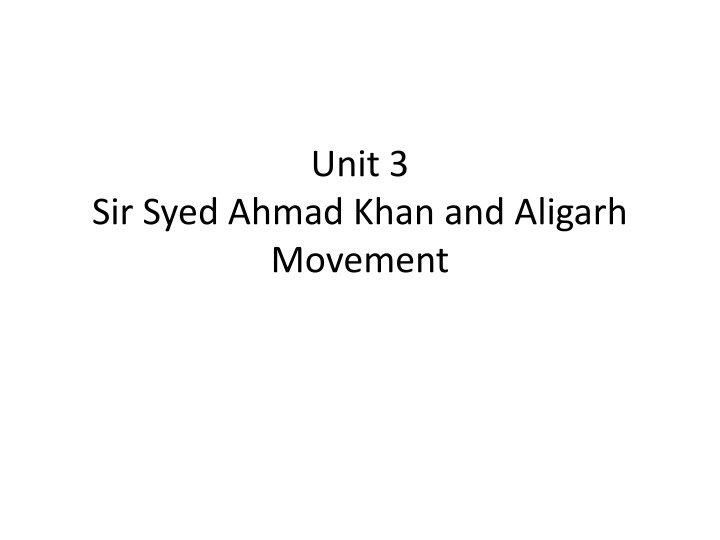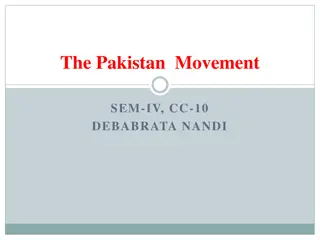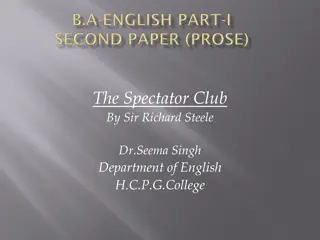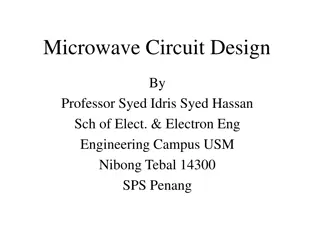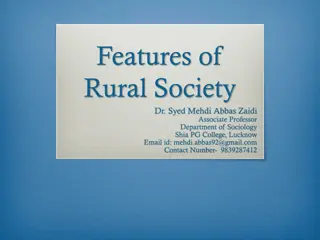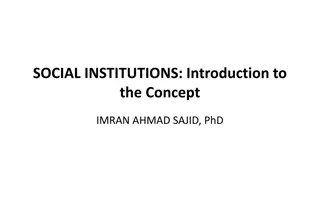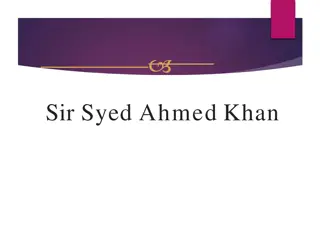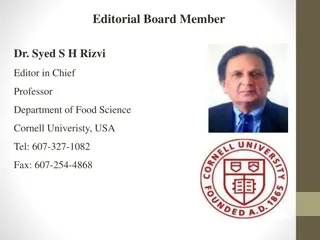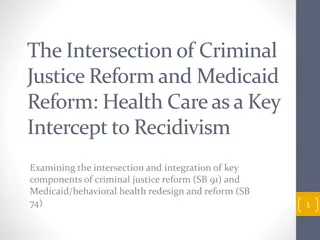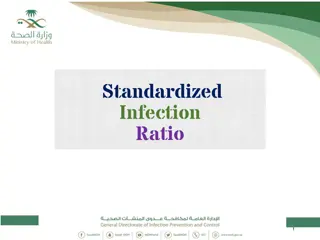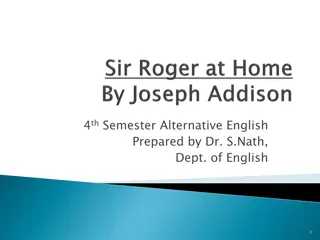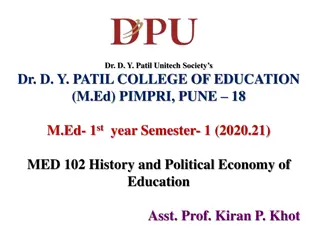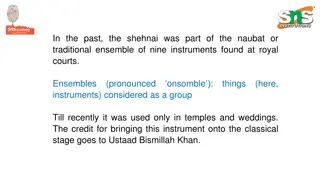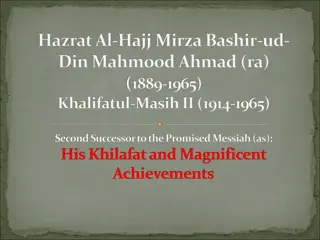Sir Syed Ahmad Khan: The Pioneer of Educational Reform in India
Sir Syed Ahmad Khan, a prominent Muslim scholar and reformer, played a crucial role in awakening the Muslim community to strive for educational upliftment and societal progress. Despite facing financial challenges, he excelled in various fields of study and contributed significantly to improving educational standards in India. By establishing institutions like Aligarh Muslim University and promoting literature and educational journals, Sir Syed left a lasting impact on the educational landscape of the country.
Download Presentation

Please find below an Image/Link to download the presentation.
The content on the website is provided AS IS for your information and personal use only. It may not be sold, licensed, or shared on other websites without obtaining consent from the author.If you encounter any issues during the download, it is possible that the publisher has removed the file from their server.
You are allowed to download the files provided on this website for personal or commercial use, subject to the condition that they are used lawfully. All files are the property of their respective owners.
The content on the website is provided AS IS for your information and personal use only. It may not be sold, licensed, or shared on other websites without obtaining consent from the author.
E N D
Presentation Transcript
Unit 3 Sir Syed Ahmad Khan and Aligarh Movement
Introduction Sir Syed Ahmed khan was a great Muslim Scholar and Reformer. Sir Syed Ahmed Awakened the Muslims from their Slumber to put up a struggle for the revival of their past position of eminence.
Sir Syed Ahmad Khan Name Syed Ahmed Taqvi Born Father Mother Maternal Grand Father Khawaja Farid-ud-din Khawaja Farid-ud-din had twice served as Prime Minister of Mogul Emperor and held trustworthy position under the East India Company. 17 Oct 1817 Delhi Mir Muttaqi Aziz-un-Nisaa
Education He got his primary education from his maternal grandfather, which include, Study of Holy Quran, Arabic and Persian Literature. Later he also acquired excellence in history, mathematics and medicine. But he didn t complete the medicine course. He had also been introduced to some of India s most able writers and had developed a love for literature. Financial difficulties put an end to Sir Syed's formal education.
Employment In 1840 he joined East India company as Record Keeper (Naib Munshi), he rose to the position of chief Assessment Official ( Chief Judge in some references). May 10, 1857, Sir Syed was serving as the chief Assessment officer at the court in Bijnor, he saved the lives of British Women and Children at risk of his life.
Writings Asar-us-Sanadid Risala Asbab-e-Baghawat-e-Hind Indian Musalmans Essay on the life of Muhammad (PBUH)
Educational Services Sir Syed played a vital role in the educational uplift of the Muslims in India. He did the following things to improve the educational standards: set up a journal, Tahzib-ul-Akhlaq, which contained articles of influential Muslims who agreed with Sir Syed's approach towards education.
Educational Services Educational Institutes: i. Opened school in murdabad in 1859 ii. founded scientific society in Ghazipore in 1863. iii.Victoria School Ghazipur 1864. iv.Aligarh Institues Gazette. v.Mao High School in 1875 which was later became MAO college. vi.Aligarh Muslim University(AMU) in 1920. vii.Organized the Mohammedan Educational Conference.
Political Services Sir Syed also increased the political awareness of Muslims in the Sub-continent. At first he believed in Hindu-Muslim unity but later resolved to the two-nation theory. In 1885 the Indian National Congress was set up. It claimed to be the body of every Indian regardless of religion. However it later proved to be functioning only for the Hindus and tried to eradicate the Muslims. The Congress made three demands:
CONT political representation according the population. This obviously meant Hindu domination as they were a dominant majority in India and Sir Syed opposed it. Appointment in government should be by competitive examinations. Sir Syed opposed this because he knew that the educational standards of the Hindus was much better than the Muslims.\ The next official language should be Hindi replacing Urdu. Urdu had a special place in the Muslim hearts and Sir Syed opposed this. This demand was accepted by the British.
Political Services I.Advice To Students: Sir Syed s advice to Muslims in the political field is also important. He believed that under the European system or democratic government the Muslims of India would always be at the mercy of Hindu majority. He suggested separate electorate for Muslims. He advised the Muslims not to join Congress.
II.Urdu-Hindi Controversy: In 1867, Hindus demanded that Hindi should be made an official language of India in place of Urdu. They started an agitation. The Hindus were against Urdu because it was the language o the Muslims. Muslims opposed this and supported Urdu as it was the sign and united the Muslims of the India under one language. Due to this reason Sir Syed started Two Nation Theory
Two Nation theory Sir Syed Ahmed Khan played a vital role in improving the Muslim status. He worked tirelessly to restore relations between the Muslims and the British. He brought the Muslim revival through the Aligarh movement and showed the importance of education.
CONT Sir Syed convinced that the Hindus would never be friend with the Muslims. He brought an idea about the Two-nation theory and is hence known as "The Father of The Pakistan Movement .
Journey to England In 1868, he went England and visited educational institutions. The University of Cambridge impressed him the most. This visit provided him an opportunity to think over and give a final shape to his plan to establish institutions in India.
Honors Legislative Council (1878-1883) Was appointed as Member of Public Service Commission in 1887. The Government of that time centered the Title of SIR on him. Was made a Knight Commander of the Star of India. Worked Member of Governor General s
Sir Syed was interested in Muslims. He wanted to improve relations with British and the positions of Muslims. The Aligarh Movement was founded by Sir Syed Ahmed Khan, the greatest Muslim educationist of the 19th Century.
CONT The Services which Sir Syed Ahmed khan rendered for the Muslims are known as the Aligarh Movement in the history of Muslims of India.
Aims of Alligarh Movement The central aims of the Aligarh Movement were to: Improve relations between the British and Muslims communities by removing British doubts about Muslim loyalty and Muslim doubts about the British intentions.
CONT Aligarh movement was aimed at apprising the British that Muslims are not only responsible for the War and therefore undue wrath should not be inflicted to them. To persuade the Muslims to get modern education
Objectives I. To create an atmosphere of Mutual understanding between the British Government and Muslims. II. To persuade Muslims to learn English Education. III. To persuade Muslims to abstain from politics of agitation. IV. To produce an intellectual class from amongst the Muslim Community.
CONT The British Government Excluded the Muslims from reasonable government Jobs. In Government Office of Calcutta a Muhammadan (Muslim) could hope only for any post above the rank of a porter, messenger and Ink filler-Pots.
Causes of Aligarh Movement After the War of independence of 1857 the British did not trust on Muslims, according to them British thought Muslims were only cause of War of Independence. As a result they adopted policy of oppression and repression towards Muslims. Suffering of Muslims Doubled when Muslims refused to send their Children to Missionary/ European and Government Schools because they hated English Language.
Works ( Aligarh Movement) Farsi Maddarsa Muradabad (1859) Victoria School Ghazipur (1864) Establishment of Scientific Society Aligarh Institute Gazzatte Tehzib-ul-Ikhlaq (Magazine) {MAO} Muhammadan Anglo Oriental College, Aligarh (8th January 1877) Muhammadan Educational Conference (1886) Aligarh Muslim University ( His Dream came into being in 1920 after 22 years of his death.)
CONT Besides his prominent role in the educational uplift of the Muslims, Syed Ahmed Khan s writings played an important role in popularizing the ideals for which Aligarh stood. He also succeeded in enlisting the services of a number of Distinguished English professors like Bech, Morison, Raleigh and Arnold to stood Aligarh college into a first rate institute.
CONT Syed Ahmed s Aligarh Movement played a significant role in brining about an intellectual revolution among the Indian Muslims, thus he succeeded in achieving his objectives, which were Educational Progress and Social Reform. His efforts earned Sir Syed the title Prophet of Education , Education is actual base of Pakistan.
All India Mohammadan Educational Conference
Introduction As M.A.O College Aligarh, the greatest dream of Sayyid Ahmed khan was achieved and this achievement turned the tides for future events. Still he realized that college was unable to fulfill educational problems of Muslims of India. Sayyid Ahmed khan launched All-India Muhammedan Educational Congress in 1886, later on changed to Conference for Muslims to provide them a forum through which they could get educational awareness.
CONT The All India Muhammadan Educational Conference was an organization promoting modern, liberal education for the Muslim community in India. It was founded by Sir Syed Ahmed Khan, also the founder of the Aligarh Muslim University. All India Mumammadan Educational Conference was the origin of the All-India Muslim League.
CONT All India Muslim Educational Conference (AIMEC), a Non-political organization which brought Muslims social and political leaders, intellectuals and distinguished people from all of walks of life onto one platform for educational empowerment of Muslims of India. It transformed the dimensions of Aligarh Movement and fulfilled the dream of its founder, Sir Syed Ahmad Khan by converting Muhammadan Anglo Oriental College (M.A.O. College) to Aligarh Muslim University.
CONT The Conference also became championing the cause of Women s education and gave birth to one of the oldest and biggest women s educational institution, Women s College of Aligarh. This non-political, All India Muslim Educational Conference which was started for educational empowerment of Muslims of India also gave birth to largest Muslim political party Muslim League .
CONT The AIMEC held it inaugral meeting on December 27,1886 at M.A.O College in the chair Moulvi Samiullah Khan. It was attended by 161 delegates from all over. The Inaugural session at Aligarh adopted the following resolutions: Establishment of AIMEC and to hold its annual session in different parts of the country. British Government should only take care of modern and western education.
CONT Muslims will take care of Oriental studies. Promote publications of journals and special attention should be paid for memorization of Quran (Hifz-e-Quran) The Head Office of Muslim Educational Congress will be at Aligarh.
objectives of the Conference The main objectives of the Conference were: To provide a platform for Muslims to get higher education. To arrange a forum through which religious education should be taught in English medium schools of Muslims. To provide a forum for ullama and religious scholars to encourage diniyat and oriental studies in the schools of Muslims, and support them to take forward religious tasks. To provide a forum, through which the declined status of religious institutions should be improved.
CONT The annual meetings of AIMEC were regularly held every year in different parts of the country. Sir Syed Ahmed acted as the secretary of the Conference till the time of his death. He himself took care of regularly publishing of conference proceeding every year.
CONT The holding of meeting every year under conference proved a great success for their required results. People from all-India gathered and sit together, to talk about their problems, solutions, and suggestions. This was the first and the only platform for the Muslims where they gathered for their united cause. The AIMEC conference provided a unique platform.
CONT One branch of conference was anjuman-e- tarraqi-e-urdu, in which many important tracts were published under the conference like Musilmanon ki ghuzishta taleem , Al-jazia and few articles like Kutab Khana Sikanderia , Huqooq-uz-Zimmiyan , Muslimanon ki Taraqqi-o-Tanazili kai Asbab .
CONT The AIMEC also provided the platform for Muslims to display their inborn qualities of people like Moulana Shibli Nomani, Moulana Altaf Hussain Hali, Mohsin-ul-Mulk and Moulvi Nazir Ahmed.They used their hidden talents through this platform by delivering speeches and poetry to show their desire for education, passion for self respect and national sympathy. Through this platform greatest contemporary literacy figures were sharpened like Abdul Kalam Azad.
Initiatives of the Conference The conference took the initiative to look after the matters concerning the Indian Muslims generally: i) Oriental and religious education should be started in Government Schools. ii) Social issues; to curb Non-Islamic and heinous traditions from the Muslim society. iii) An extra effort to put for promotion of women s education. iv) Demands were made to remove derogatory and anti-Islamic contents from History course books.
CONT V) Translation of literary works of different languages into Indian languages. vi) The need of women education was felt and a proposal to start a women education section in Muslim Educational Conference was accepted. The idea to start girl s schools is all the state capitals was initiated. Later, girls school at Aligarh was established. vii) Conference also accepted Theodore proposal regarding education reforms to continue their struggle and effort regarding education.
CONT As AIMEC was a non political organization, yet anything delivered through platform of conference was considered collective demand of Muslims. Sayyid Ahmed also delivered his first anti-congress speech through this platform.
All India Muslim League The first ever political party of the Muslims in the history of India, The All India Muslim League was formed on the platform of this conference. AIMEC played very important role in the life of Muslims to get their rights, education and later on separate state in the shape of Pakistan.
Death Great Scholar and Leader died on 27th March 1898, at Aligarh, India.
